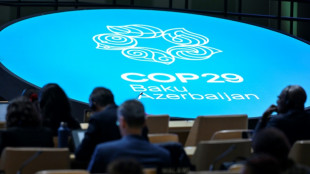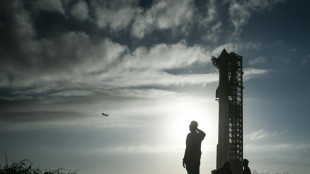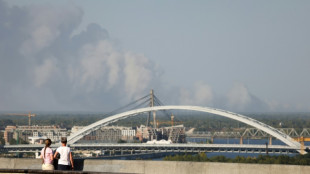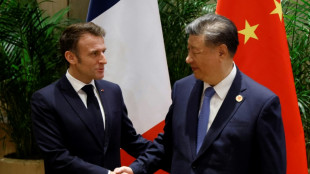
-
 SpaceX fails to repeat Starship booster catch, as Trump looks on
SpaceX fails to repeat Starship booster catch, as Trump looks on
-
G20 summit ends with Ukraine blame game

-
 Trump appoints TV celebrity 'Dr. Oz' to key US health post
Trump appoints TV celebrity 'Dr. Oz' to key US health post
-
European stocks fall on Ukraine-Russia fears, US focused on earnings

-
 Last-gasp Szoboszlai penalty rescues Hungary draw with Germany
Last-gasp Szoboszlai penalty rescues Hungary draw with Germany
-
Germany, Netherlands draw as Nations League group stage ends

-
 Hong Kong tycoon Jimmy Lai takes witness stand in collusion trial
Hong Kong tycoon Jimmy Lai takes witness stand in collusion trial
-
Guardiola set to extend stay as Man City boss - reports

-
 Minnows Botswana hold Egypt to qualify with Mozambique, Tanzania
Minnows Botswana hold Egypt to qualify with Mozambique, Tanzania
-
Inter Miami coach Martino leaving club for 'personal reasons' - club source

-
 Chinese man sentenced to 20 months for Falun Gong harassment in US
Chinese man sentenced to 20 months for Falun Gong harassment in US
-
Hong Kong court jails 45 democracy campaigners, drawing condemnation

-
 'I did it for Rafa': Alcaraz after keeping Spain Davis Cup dream alive
'I did it for Rafa': Alcaraz after keeping Spain Davis Cup dream alive
-
Alcaraz keeps Spain and Nadal Davis Cup dream alive

-
 Trump names China hawk Howard Lutnick commerce secretary
Trump names China hawk Howard Lutnick commerce secretary
-
Europe's pivotal role in bid to strike COP29 climate deal

-
 MotoGP champion Martin falls on Aprilia debut
MotoGP champion Martin falls on Aprilia debut
-
Bodies burned after Haiti police, civilians kill 28 alleged gang members

-
 'Probably my last match': Nadal after Davis Cup singles defeat
'Probably my last match': Nadal after Davis Cup singles defeat
-
Iran faces new censure over lack of cooperation at UN nuclear meeting

-
 Afghan woman teacher, jailed Tajik lawyer share top rights prize
Afghan woman teacher, jailed Tajik lawyer share top rights prize
-
Pressure mounts on Scholz over bid for second term

-
 Take two: Biden makes it into G20 leaders' photo
Take two: Biden makes it into G20 leaders' photo
-
Russia vows response after Ukraine fires long-range US missiles

-
 Spain's Nadal loses in Davis Cup quarter-finals singles opener
Spain's Nadal loses in Davis Cup quarter-finals singles opener
-
Four elite Brazil officers arrested over alleged 2022 Lula murder plot

-
 SpaceX set for Starship's next flight -- with Trump watching
SpaceX set for Starship's next flight -- with Trump watching
-
Trump ally seeks to block trans lawmaker from women's restrooms

-
 Slovakia oust Britain to meet Italy in BJK Cup title match
Slovakia oust Britain to meet Italy in BJK Cup title match
-
Top-selling daily French daily Ouest-France stops posting on X

-
 Russian invasion toll on environment $71 billion, Ukraine says
Russian invasion toll on environment $71 billion, Ukraine says
-
'Sabotage' suspected after two Baltic Sea cables cut

-
 'You will die in lies!': daughter clashes with father at French rape trial
'You will die in lies!': daughter clashes with father at French rape trial
-
Spain Women drop veterans Paredes and World Cup kiss victim Hermoso

-
 Stocks diverge on fears of Ukraine-Russia escalation
Stocks diverge on fears of Ukraine-Russia escalation
-
New Botswana leader eyes cannabis, sunshine to lift economy

-
 'Operation Night Watch': Rembrandt classic gets makeover
'Operation Night Watch': Rembrandt classic gets makeover
-
Haiti police, civilians kill 28 gang members: authorities

-
 Taxing the richest: what the G20 decided
Taxing the richest: what the G20 decided
-
'Minecraft' to come to life in UK and US under theme park deal

-
 IMF, Ukraine, reach agreement on $1.1 bn loan disbursement
IMF, Ukraine, reach agreement on $1.1 bn loan disbursement
-
Japan on cusp of World Cup as Son scores in Palestine draw

-
 Chelsea condemn 'hateful' homophobic abuse towards Kerr, Mewis
Chelsea condemn 'hateful' homophobic abuse towards Kerr, Mewis
-
Hamilton to race final three grands prix of Mercedes career

-
 Gatland has not become a 'bad coach' says Springboks' Erasmus
Gatland has not become a 'bad coach' says Springboks' Erasmus
-
Slovakia take Britain to doubles decider in BJK Cup semis

-
 Brazil arrests soldiers over alleged 2022 Lula assassination plot
Brazil arrests soldiers over alleged 2022 Lula assassination plot
-
Ukraine war and climate stalemate loom over G20 summit

-
 Ukraine fires first US long-range missiles into Russia
Ukraine fires first US long-range missiles into Russia
-
Retiring Nadal to play singles for Spain against Netherlands in Davis Cup


Ukraine war brings bitter harvest to Moldovan orchards
A warehouse in Moldova is piled high with crates of red apples but for an industry reeling from war in neighbouring Ukraine, the sight is far from appetising.
The conflict has all but ended apple exports to Russia, traditionally the main buyer of produce from Moldova's orchards.
"I don't know what we are going to do with the apples that are left over," admits grower Valeriu Matcovschi.
"There are too many for us to sell on the Moldovan market," he says in the northern village of Bilicenii-Vechi.
In normal times, lorries would arrive at least five times a week to take his 2,000-tonne yearly harvest to Russia.
Now he is scrambling to find new customers.
In late March he sent a first shipment to Kuwait, but he had to slash his prices by a third and accommodate clients with different demands about which varieties of apple they will take.
"I hope I won't have to start pulping the fruit. That would be a tragedy," he says.
Moldova is one of the poorest countries in Europe. The former Soviet republic of around 2.6 million people is sandwiched between Ukraine and Romania.
- Desperate appeals -
Moldova is in a "difficult situation", senior government official Dumitru Udrea told AFP.
More than 360,000 Ukrainians have fled into Moldova since the start of Russia's invasion. The vast majority have travelled on elsewhere, but 90,000 have stayed.
Energy price hikes, already rising but now exacerbated by the war, could push inflation to 30 percent by the end of the year.
Udrea fears the effects of the war mean that "in 2022 we could see a recession of between three and 15 percent".
The largely rural country, whose gross domestic product (GDP) is 0.4 percent that of Britain's, was already struggling to recover from a string of political and economic crises.
These came on top of a 2014-15 banking scandal that led to the disappearance of around one billion dollars (911 million euros).
Responding to desperate appeals from Moldova -- which formally asked to begin the process of joining the EU at the beginning of March -- Germany, France and Romania are holding a donors' conference in Berlin on Tuesday to help lighten the load.
Udrea says the government hopes for four billion euros from donors to boost energy security and protect Moldovans' purchasing power.
Thanks in part to a 2014 association agreement with the EU -- which drew the ire of Moscow -- trade with countries to its west now accounts for more than 60 percent of Moldova's total foreign trade.
- Ties to Russia -
But some traditional economic ties with Russia, Ukraine and Belarus have been less easy to replace.
"At first sight the share of exports to these countries -- 15 percent -- doesn't seem huge but several sectors are very dependent on it, above all apple growers," economist Adrian Lupusor, from the Expert-Grup think tank, told AFP.
Construction and agriculture are dependent on materials shipped from Russia and Ukraine. "Even if importers find suppliers elsewhere, the prices will be much higher," Lupusor says.
Udrea says the war could also see a plunge in the vital remittances sent back to Moldova by the more than one million people who have emigrated over the past 20 years.
That stream of income is a lifeline for many who remain in the country and represents some 15 percent of GDP.
Lupusor says that some of the 300,000 or so Moldovans working in Russia may decide to come back, putting the labour market and social security system under fresh pressure.
Meanwhile in Bilicenii Vechi, as workers sort shiny apples and forklift trucks trundle around him, Matcovschi worries for the future of the 50 or so people he employs.
Asked about possible redundancies, he replies, "I dare not think about it."
"I hope we'll be able to hold out."
O.Brown--AT
